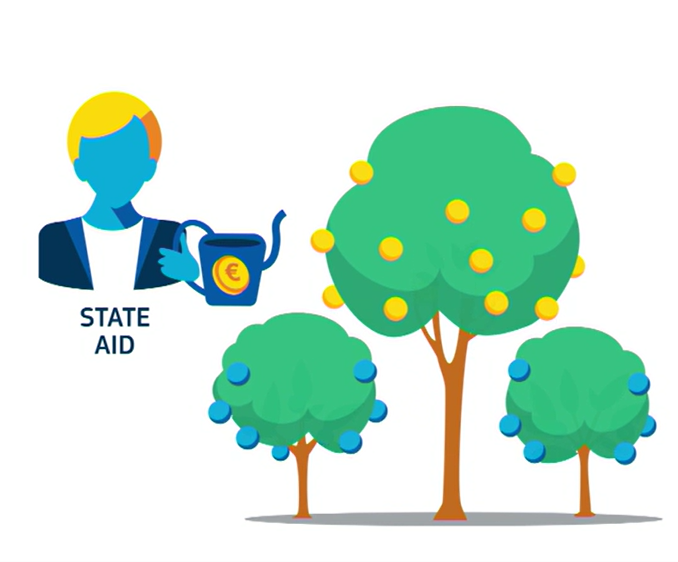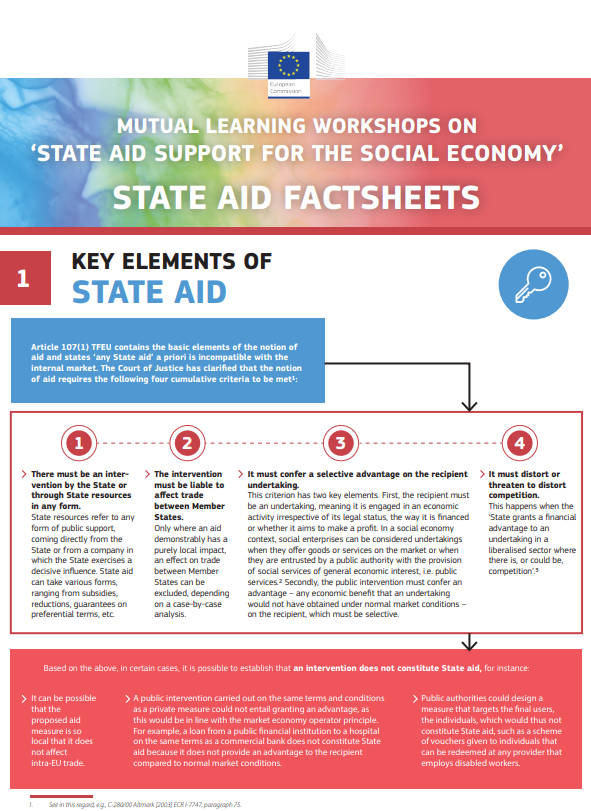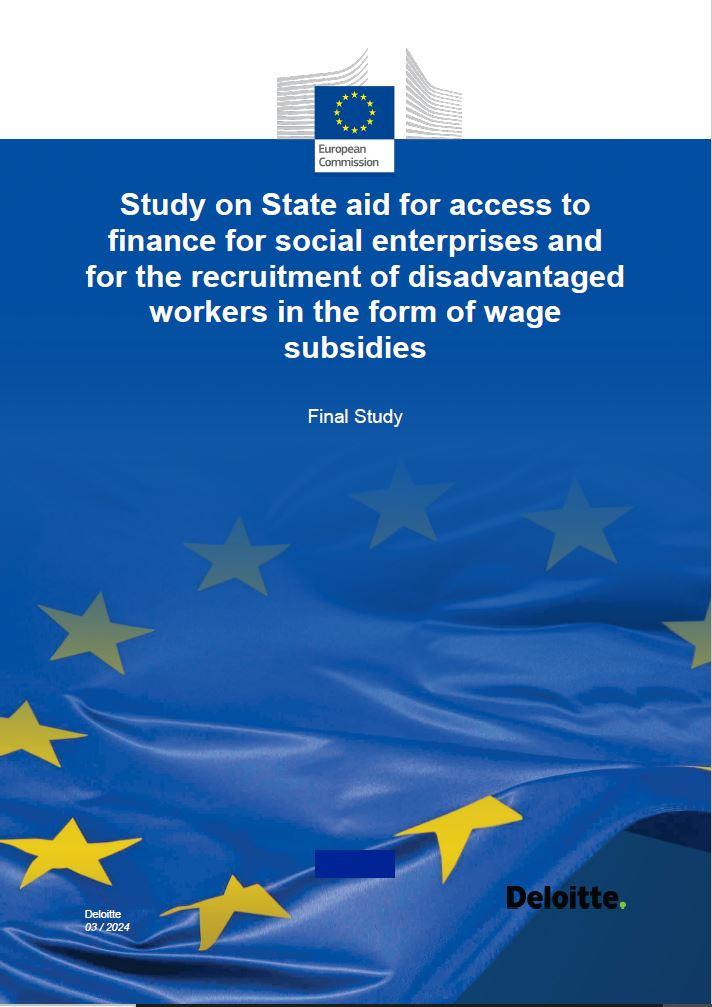Social economy and State aid rules
Public financial support frequently plays an important role in the start-up and development of social economy actors. EU State aid control seeks to maintain a balance between this support and fair competition. However, State aid rules are complex and sometimes insufficiently mastered by those who apply the rules and are therefore not always used to the extent possible. Many forms of aid are actually allowed by the EU. This page displays the necessary information for making the best of existing State aid rules.

1. The notion of “State aid” and the basics of State aid control
A public support measure that is not State aid within its EU meaning is not subject to monitoring. For a measure to qualify as State aid, different criteria must be fulfilled. If they are, the measure is either not acceptable (i.e. “incompatible with the internal market”) or is acceptable because there is a justification for it. The possible justifications (for instance, environmental protection, recruitment of disadvantaged workers…) are spelled out in different EU texts. In principle, the national authorities that want to implement the State aid measure have to notify it to the European Commission for its prior authorisation. Today however, many types of State aid measures can be implemented directly if they comply with the conditions spelled out at EU level.
With the video here below, you will learn about the notion of State aid and the basics of State aid control from the perspective of the Social Economy. It is only 4’20’’ long.
After the video, we recommend the reading of this paper (situation on 1st May 2023), titled “State aid support for the social economy: State aid fundamentals”. It will give you the basis you need for your State aid projects and entails concrete examples.
If you watched the video and read the paper, you are ready to jump to the next step. However, you may find more information on the fundamentals of State aid by consulting the other materials the Commission produced for a mutual learning activity organised for public officials on 12 May 2023. You will find the presentation of the expert (slides and recording) and the flash report of the workshop:
2. The General Block Exemption Regulation
The General Block Exemption Regulation (Regulation n°615/2014 or “GBER”) is the central piece of the EU State aid rules. For a lot of different types of aid (regional aid, training aid, aid to SMEs…), this Regulation details the conditions under which they are acceptable (i.e. compatible with the internal market) and, by consequence, exempted for the notification to the European Commission. Knowing how to use this Regulation is therefore a genuine advantage!
For social economy stakeholders, some sections of the GBER are particularly important. These are the ones related to “Access to finance”, “Training, skills and access to the labour market”, “SMEs & Innovation” and “Infrastructures that support the social economy”. With the video here below, you will learn about the GBER, its content and application. It is only 4’35’’ long.
After the video, we recommend the reading of this paper (situation on 1st May 2023) about the GBER. The most relevant aspects for social economy are clearly presented.
Good news: if you watched the video and read the paper, you are almost a State aid expert and are ready to jump to the last step, the issue of services of general economic interests. However, you may find more information on the GBER and its concrete use by consulting the other materials the Commission produced for a mutual learning activity organised for public officials on 12-13 June 2023. You will find the presentation of the expert (see slides) and the synthesis report of the workshop. The latter will give you concrete tips to build compliant State aid interventions.
Revised general de minimis regulation adopted
In December 2023, the Commission adopted the new general de minimis regulation, while the previous de minimis regulation expired on 31 December 2023. The main changes are an increased ceiling of EUR 300 000 over three years to adjust to inflation and the introduction of a mandatory de minimis register at national or EU level to increase transparency, thereby relieving companies from the obligation to keep record of the de minimis aid they received.
3. Services of general economic interest
A specific chapter of EU rules is related to services of general economic interest (SGEI). These rules open up considerable possibilities for State aid. However, entities can only benefit from this flexibility if they have been entrusted with a specific mission, i.e. the SGEI. Public authorities do not always use this possibility to its full potential, for example in relation to the activities of social enterprises focusing on the provision of jobs for vulnerable people.
What is an SGEI? How can it be financed? With the video here below, you will find the replies. It is only 4’23’’ long.
After the video, the reading of the paper below (situation on 1st June 2023) will give you more details and many concrete illustrations.
You may find more information and concrete examples in the other materials the Commission produced for a mutual learning activity organised for public officials on 29 June 2023. You will find the presentation of the expert (see slides and recording) and the synthesis report of the workshop.
Revised SGEI de minimis regulation adopted
In December 2023, the Commission adopted the new SGEI de minimis regulation, while the previous SGEI de minimis regulation expired on 31 December 2023. The main changes are an increased ceiling of EUR 750 000 per SGEI provider over three years to adjust to inflation and the introduction of a mandatory SGEI de minimis register at national or EU level to increase transparency, thereby relieving companies from the obligation to keep record of the SGEI de minimis aid they received.
We hope you have now all the tools for exploring and applying safely State aid possibilities.
You can keep this factsheet with you as a simple reminder:

- General publications
- 11 September 2023
This factsheet summarizes the most important information about State Aid and the social economy on a few pages.
Study on State aid
In April 2024, the European Commission published a study looking into the topic of State aid and social economy. The title of the study is: Study on State aid for access to finance for social enterprises and for the recruitment of disadvantaged workers in the form of wage subsidies
It examines how GBER rules are applied for social enterprises as regards aid for access to finance and aid for the recruitment of disadvantaged workers.


